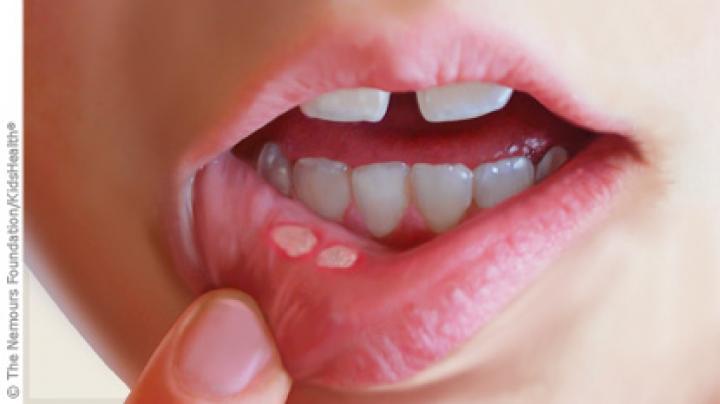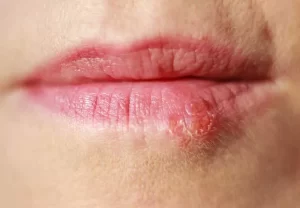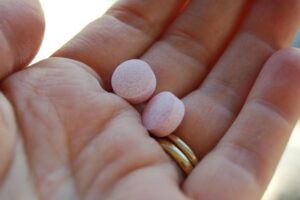What is the White Stuff in a Canker Sore

The White Stuff in Your Canker Sore: Understanding Fibrin and Healing
Canker sores, also known as aphthous ulcers, are those pesky little mouth ulcers that can cause a world of pain and discomfort. While they’re generally harmless and heal on their own within a week or two, the white film often present in them can be a cause for concern. But what exactly is this white stuff, and how does it contribute to the healing process? This comprehensive guide delves deep into the world of canker sores, focusing on the white film (fibrin) and the journey towards a pain-free recovery.
The Unwanted Guest: Demystifying the White Film
The white film you see in a canker sore isn’t some mysterious infection; it’s actually a natural part of your body’s healing response. This film is composed primarily of fibrin, a protein produced by the blood when tissue damage occurs.
Fibrin’s Role in Canker Sore Healing:
- Clot Formation: When the canker sore forms, blood vessels in the damaged area rupture. Fibrin acts as a natural clotting agent, forming a protective barrier over the sore. This barrier helps to:
- Reduce bleeding: Fibrin’s clotting properties minimize further blood loss, promoting wound closure.
- Prevent infection: The fibrin barrier acts as a physical shield, preventing bacteria and other pathogens from entering the wound and causing complications.
- Support tissue repair: Fibrin serves as a scaffold, providing a framework for new tissue growth to begin.
The Lifecycle of Fibrin in a Canker Sore:
- Injury and Bleeding: The canker sore develops, causing damage to the delicate tissues inside your mouth. Blood vessels in the area rupture, leading to bleeding.
- Fibrinogen Activation: Blood clotting factors, including fibrinogen, are activated in response to the bleeding.
- Fibrin Formation: Fibrinogen undergoes a conversion process, transforming into fibrin, a mesh-like network of protein strands.
- Clot Formation and Protection: The fibrin strands interweave, forming a clot that covers the canker sore. This clot provides the aforementioned benefits of reducing bleeding, preventing infection, and supporting tissue repair.
- Fibrin Breakdown and Healing: As the canker sore heals, white blood cells gradually break down the fibrin clot. This breakdown allows for new tissue growth and the gradual disappearance of the white film.
Beyond Fibrin: Other Components of the White Film
While fibrin is the main player, the white film in a canker sore might also contain:
- Dead Cells: Damaged cells in the area of the ulcer contribute to the white film’s appearance.
- White Blood Cells: These immune system warriors migrate to the site of the canker sore to fight off any potential infection.
When to Worry About the White Film:
The white film associated with canker sores is typically harmless and disappears on its own as the sore heals. However, there are some situations where you might want to consult a healthcare professional:
- Excessive White Film: If the white film appears unusually thick or covers a large area of your mouth, it could be a sign of a more serious condition like thrush, a fungal infection.
- Slow Healing: If your canker sore and the white film persist for more than two weeks without any signs of improvement, consult your doctor to rule out any underlying causes.
- Severe Pain or Discomfort: While canker sores are typically painful, if the pain becomes unbearable or interferes significantly with eating or talking, seek medical advice.
The Quest for Relief: Soothing Canker Sore Discomfort
While the white film plays a vital role in healing, a canker sore’s discomfort can be quite bothersome. Here are some tips to find relief:
- Over-the-Counter Relief: Several over-the-counter medications can help manage canker sore pain. Look for topical ointments containing anesthetics like lidocaine to numb the area or mouthwashes containing chlorhexidine to reduce inflammation.
- Saltwater Rinse: A warm saltwater rinse can help reduce inflammation and provide temporary relief. Dissolve 1/2 teaspoon of table salt in a glass of warm water and gently swish for 30 seconds.
- Soothing Foods: Avoid spicy, acidic, or rough foods that can irritate the canker sore further. Opt for soft, bland foods like mashed potatoes, yogurt, or applesauce.
- Lifestyle Modifications: Maintaining good oral hygiene by brushing and flossing regularly helps prevent additional irritation. Additionally, managing stress levels can contribute to faster healing as stress can exacerbate canker sores.
The FAQ Symphony: Addressing Your Canker Sore Concerns
Now, let’s address some frequently asked questions (FAQs) regarding canker sores and the white film:
-
Q: What causes canker sores?
- A: The exact cause of canker sores remains unknown, but several factors can contribute to their development, including:
- Minor mouth injuries: Accidental bites, scratches from your toothbrush, or ill-fitting dentures can trigger canker sores.
- Stress: Emotional stress can weaken the immune system and make you more susceptible to canker sores.
- Nutritional deficiencies: Deficiencies in certain vitamins, like vitamin B12 or iron, can contribute to canker sores.
- Hormonal changes: Fluctuations in hormone levels, particularly during menstruation, can trigger canker sores for some women.
- Certain foods: Certain foods high in acidity or with specific ingredients like cinnamon or citrus fruits can trigger canker sores in some individuals.
- Certain medications: Some medications, like some nonsteroidal anti-inflammatory drugs (NSAIDs), can increase the risk of canker sores.
- A: The exact cause of canker sores remains unknown, but several factors can contribute to their development, including:
-
Q: Are canker sores contagious?
- A: No, canker sores are not contagious. You cannot spread them through kissing or sharing utensils.
-
Q: How can I prevent canker sores?
- A: While there’s no guaranteed way to prevent canker sores completely, these tips can help:
- Maintain good oral hygiene: Brushing twice daily and flossing regularly removes bacteria that can irritate your mouth.
- Avoid mouth injuries: Be careful when brushing your teeth and flossing to prevent accidental bites or scratches.
- Manage stress: Stress can be a trigger for canker sores. Practice relaxation techniques like yoga or meditation to manage stress levels.
- Identify and avoid triggers: If you suspect certain foods or medications trigger your canker sores, try to avoid them.
- Maintain a healthy diet: Ensure a balanced diet rich in essential vitamins and minerals to support your immune system.
- A: While there’s no guaranteed way to prevent canker sores completely, these tips can help:
-
Q: What if my canker sores are recurring frequently?
- A: If you experience frequent or severe canker sores, consult your doctor. They can help identify any underlying medical conditions that might be contributing to the problem and recommend appropriate treatment options.
Living with Canker Sores: Acceptance and Management
Canker sores are a common nuisance, but understanding the white film (fibrin) and its role in healing can ease your concerns. While they can be painful, remember, they’re usually harmless and temporary. By implementing preventative measures and seeking relief for discomfort, you can navigate these episodes effectively and maintain a healthy, comfortable mouth.
Beyond the Basics: Exploring Additional Considerations
This guide provides a solid foundation for understanding canker sores and the white film, consider incorporating the following:
- Differential Diagnosis: Discuss conditions that can mimic canker sores, such as hand, foot, and mouth disease (HFMD) or herpes labialis (cold sores). Explain the key differences in appearance, cause, and treatment.
- Images and Visuals: Include high-quality images of canker sores with varying degrees of white film to provide a clear visual representation. Consider adding infographics summarizing the healing process and the role of fibrin.
- Alternative Treatments: Explore some alternative and homeopathic remedies for canker sore relief, emphasizing the importance of consulting a healthcare professional before trying any new treatment.
- Oral Hygiene Practices: Delve deeper into proper oral hygiene practices that can help prevent canker sores and promote overall oral health.
- The Role of Dentistry: Discuss how regular dental checkups and cleanings can contribute to early detection of potential oral health issues that might be related to canker sores.
By incorporating these elements, you can create a comprehensive and informative resource that caters to various reader needs and optimizes your content for search engines. Remember, prioritize clear, concise language with proper medical terminology and credible sources to ensure the article’s trustworthiness.
Conclusion: A Farewell to Discomfort
Canker sores might be uninvited guests, but with knowledge and a proactive approach, you can manage them effectively. Understanding the role of the white film (fibrin) and implementing the tips outlined in this guide can empower you to navigate canker sores with confidence and minimize discomfort. Remember, prioritizing good oral health and seeking professional guidance when necessary are crucial for maintaining a healthy mouth and a pain-free smile.



